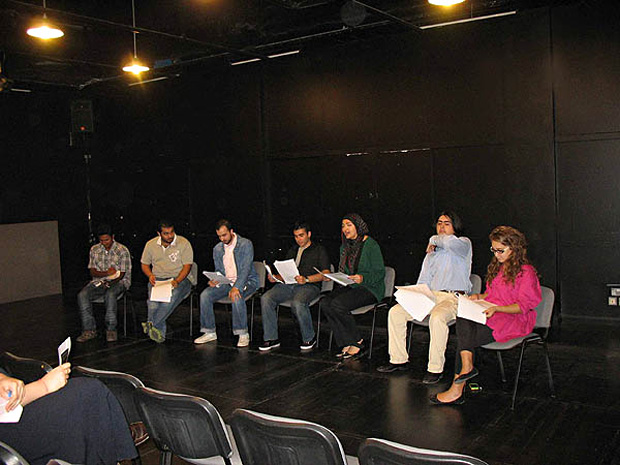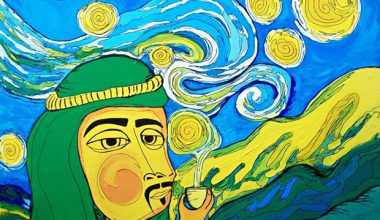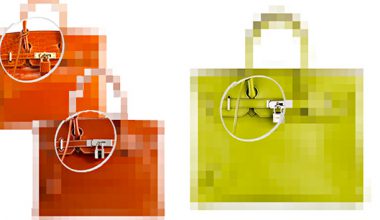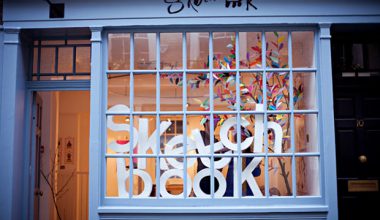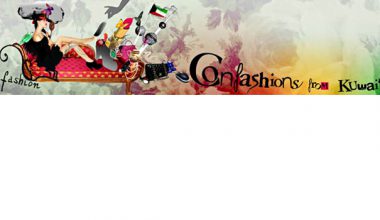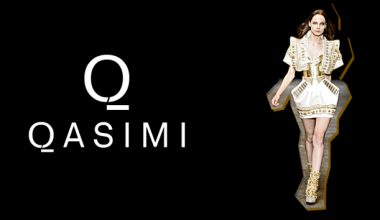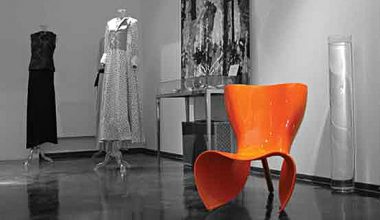
On the evening of Wednesday, the 20th of October 2010, a small audience filled the seats in Co12, the Black Box Studio at the American University of Kuwait. They found seven chairs arranged in a crescent curve on a bare stage. Dedicated members of AUK’s Drama Club, advised by Drama Professor Chris Gottschalk, took up their seats to read the play There is a Field. The wall behind the actors was plain black, but as the actors read from their scripts, the audience listened intently, as though glimpsing a strange but familiar world.
“All that anger – where did it come from? As for the years I saw, this anger came from the fathers to the fathers of those people. It became a duty. It’s our job to be there when they bring their memories to life.
We should never forget, but we should forgive.”
Thus read Abdullah Al-Bastaki in his role as Aseel Asleh, bringing his character’s memory to life. Asleh, a 17-year old boy, was one of the twelve Palestinian Israeli citizens who were killed in October of 2000 during “Land Day” protests. He joined the US-based “Seeds of Peace” Arab-Israeli coexistence camp, where young men and women discussed their situations and challenges, but also hopes while living within the borders of Israel, Palestine, and the occupied territories.
Aseel was reportedly killed while tripping over himself in an olive grove just outside his village in a demonstration; the Israeli soldiers who approached him struck the back of Aseel’s head with a rifle then shot him, leaving him in the groves for his family to collect his body. After 8 years of contact with Aseel’s family in their time of loss, and following the Israeli government’s investigative inquiries, Seattle-based playwright Jen Marlowe put together the play. With the help of Ed Mast, she put together primary source material of emails, transcripts, and interviews. Soon, There is a Field would be read in nearly 20 countries, over 40 cities, from Alice Springs to Haifa, Brooklyn to Paris, Jerusalem to Dubai, London to Nairobi, Sarajevo to Valparaiso, and Kuwait.
As part of the global theatre initiative, AUK’s drama club tapped into the movement to contribute their support for the project. That evening, their audience listened attentively to seven voices broken with emotion, exaggerated, gentle, angry, and hopeful as the story of Aseel’s life and death was retold.
The play is based on emails and correspondence between Aseel and his sister Nardeen (played by Faten Al-Kadiri), his “Seeds of Peace” friends, and emails between Nardeen and Marlowe as well as conversations, interviews and transcripts of 8 years’ worth of material. Marlowe patches it together to create some sort of narrative which, in Chris Gottschalk’s words, aims to “give voice and honour to his memory,” and whatever our own political or religious affiliations, to also offer prayers to “a young man, ten years ago, who dreamed of peace.”
One can imagine how hard it is to be able to present a play that is lucid and coherent when one must work solely with existing, non-fictional material (emails, interviews, transcripts, etc.) as Marlowe did. Although some things people say in real-life, everyday conversations can be more beautiful or eloquent than poetry, much of our speech doesn’t always translate very well in an artificial narrative. So it is sometimes with There is a Field, where the excerpts Marlowe selects end up confusing the viewers as to the place, time, or subject of the scene. Sometimes the wording of Nardeen’s or Aseel’s emails is stilted or strange, sometimes with imperfect or unusual grammar. Despite these challenges, the presence of these “real” voices definitely gave the sense of faithfully giving someone’s voice back. Even if it does not make for great fictional script, it becomes poetic at times.
Not only this, but often the present, past, and even the future were artfully interwoven in single scenes, where the audience found itself meandering in and out of Nardeen’s feelings about her brother’s death to a court scene at the Or Commission. Actors Yousef Nayef, Zaid Al-Kazemi, Nigel D’souza, and Nader Abdullah took on the roles of judges, witnesses, and soldiers to a fresh encounter with Aseel, when he was still alive, as he speaks about his experience with the “Seeds of Peace” youth. More often than not, the criss-crossing of sources was less of a drawback, and left the viewers emotionally drawn to the story.
The play was performed with great emotion and dedication from every performer. Many lines left a deep impression and some lines had an uncanny foreshadowing, as when Nardeen jokes to Aseel in an email that “You should be held with your back to the wall and shot!!!” Hassan and Jamila, Aseel and Nardeen’s parents (played by Yousef Nayef and Sarah Raji) often press their children to prioritize their education so they can be capable, independent, and carve out a bright future for their community. Aseel carries this on without compromise, but without the anger and resentment that so often accompanies troubled national memories. Nardeen says of her childhood, “In our house there was this big map of Palestine before ’48 with all the names of this destroyed villages. There were always stories of Palestine. Our life did not start when we were born.”
“Out beyond ideas of wrong-doing and right-doing there is a field. I will meet you there.” Some readers may recognize this phrase by Jalal al-Din Rumi. The inspiration behind the title, these lines are repeated often in the play, almost Daoist in transcending opposites and different camps in search for peace that everyone deserves in exactly equal measure. Aseel’s last words in the play are, “Until we meet in the field, my friend, take care.” It is as though the real Aseel knew that realistically speaking, the Israeli-Palestinian conflicts would continue for years and that those living there would still have to fight for their rights or fear for their security, but nevertheless he entertained a deep hope that eventually, we would all – everyone – meet in the field.
To learn about the play, the project, or the playwright, please visit www.donkeysaddle.org.
Images: Chris Gottschalk
– Nur Soliman

